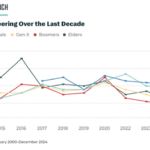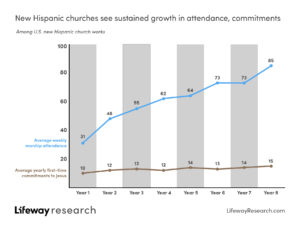
Each week, headlines tell us pastors are burnt out. They’re leaving the ministry. They’re throwing in the towel.
Pastoral ministry is too hard on the family. The demands are too high. The challenges are too difficult.
The message we hear: There’s a mass exodus of pastors.
While this story isn’t all wrong, the assertion that pastors are leaving the pulpit in droves because of ministry burnout is a myth. The research tells a different story.
And the most recent research can help us tell fact from fiction in this narrative.
1. There’s not a mass exodus of pastors
According to the latest research from Lifeway Research, only around 1 in 100 (1.2%) evangelical and Black Protestant pastors leave the ministry each year—a number that has remained statistically unchanged over the past decade.
Dramatic stories of pastors leaving the pulpit call for our attention. And while these stories certainly exist, they tend to garner a disproportionately large amount of attention. It’s true that pastors leave the ministry every year, but the percentage is small and steady. There has been no acceleration in the percentage of pastors leaving the pastorate in recent history. And those who’ve left the ministry certainly don’t amount to a large exodus of pastors.
2. Burnout is real
It’s just not leading to a mass exodus of pastors. When Lifeway Research asked current pastors why the former pastor left the ministry, burnout was among the top three most common reasons (22%).
According to this data, for every five pastors, one leaves pastoral ministry—not because of moral failure, retirement, or lack of faith—but because of burnout. Although most pastors are continuing in pastoral ministry, burnout is a factor for many who make the decision to leave the ministry.
Pastoral burnout is reality, not myth. Among those who leave the pulpit each year, burnout was a contributing factor for more than 1 in 5. The reality of burnout isn’t surprising given the demands of the pastorate. Pastors often feel unable to step back from their responsibilities, with 67% believing they must be available around the clock.
Despite this alarming strain—whether self-induced or congregation-induced—pastors are, by and large, committed to ministry in their churches.
3. Ministry is difficult
In addition to feeling the pressure to always be “on-call,” pastors experience many other difficulties in ministry.
At times, these difficulties hit close to home. Three in 10 pastors (31%) say the demands of ministry keep them from spending time with their families. And nearly 1 in 6 (16%) believe their family resents the demands of pastoral ministry.
On the church front, pastors are constantly either dealing with conflict in the church or on the lookout for conflict that may be coming. One in 5 pastors (19%) say their church has experienced significant conflict in the past year.
Even if they didn’t just come out of a season of conflict, nearly 9 in 10 pastors (88%) agree they consistently listen for signs of conflict in their churches. And 3 in 4 (74%) believe they will need to confront conflict in their churches in the future.
Sometimes the ministry tasks themselves are difficult. Other times, it’s the sheer magnitude of the ministry that presents the challenge. Nearly half of pastors (47%) say they often feel the demands of ministry are greater than they can handle. And over half (57%) say their role is frequently overwhelming.
As if the difficulties of ministry weren’t enough, many pastors feel they are facing these challenges alone, with 1 in 3 pastors (34%) saying they feel isolated as a pastor.
4. Pastors leave for a variety of reasons
It’s true that each year some pastors leave pastoral ministry. But those who leave don’t always leave for a negative reason. In fact, the most common reason a pastor leaves the pastorate is due to a change in calling (37%).
The other most common reasons for leaving pastoral ministry are conflict in a church (23%) and burnout (22%). Pastors may also leave because they are a poor fit with a church (17%) or because of family issues (12%).
Fewer than 1 in 10 leave because of moral or ethical issues (7%), illness (5%), lack of preparation for the job (4%), or personal finances (3%).
A few leave the pastorate each year, but the research shows we would do well to not rush to our own conclusions about why they left the ministry. The reasons can vary, and they aren’t all newsworthy.
5. Pastors need support
It’s undeniable that pastors face struggles in ministry. Yet most pastors are persevering despite the demands. Still, churches have a role to play in helping pastors navigate these challenges.
Most pastors feel they must be “on-call” 24 hours a day and that their role as pastor is frequently overwhelming. Some go so far as to say their churches have unrealistic expectations of them. Churches can help pastors navigate these pressures by clearly communicating the church’s expectations of the pastor to both the pastor and the congregation.
While 72% of pastors say their churches have a document that clearly communicates the church’s expectations of the pastor, nearly 3 in 10 do not. Where expectations are clearly communicated, pastors and congregations have the opportunity to thrive within healthy boundaries.
Given the unique nature of the role, many pastors feel isolated in their work. The church can bless their pastor by offering genuine friendship and encouragement as well as practical help in the ministry of the church.
While the pastor has a unique call to ministry leadership, the task of ministry doesn’t fall solely on the pastor. Rather, the pastor is to “equip the saints for the work of ministry” (Ephesians 4:12).
In this fallen world, ministry will always be difficult, and pastors will leave the ministry for a variety of reasons. But the church can offer support that will help pastors thrive in pastoral ministry for the long haul.























